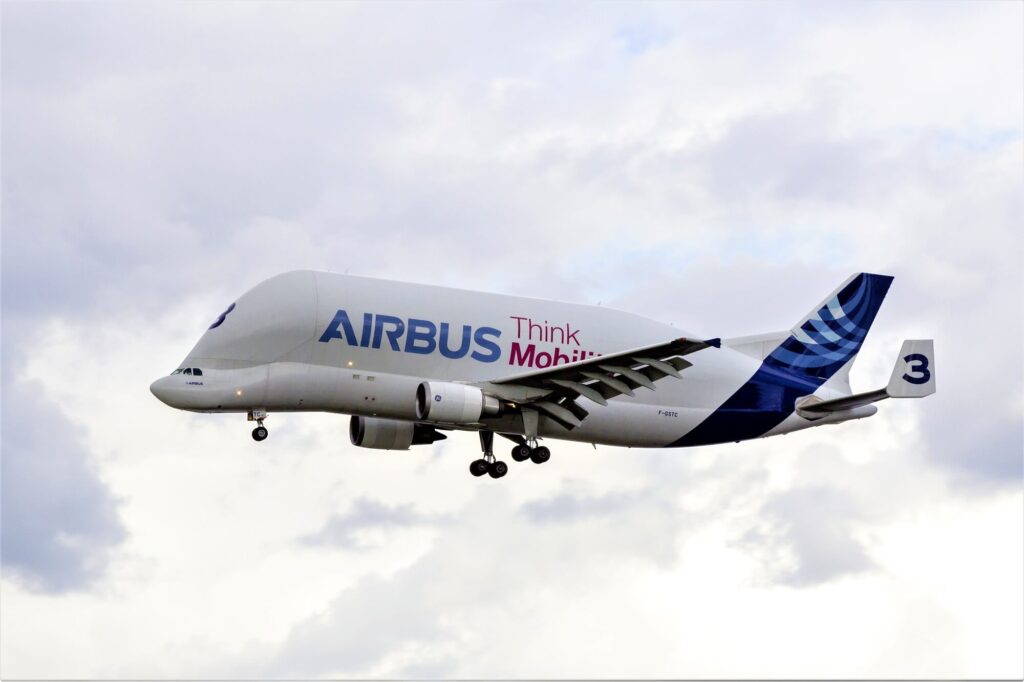The Airbus Beluga, one of the world’s largest freighter aircraft, touched down at Chhatrapati Shivaji Maharaj International Airport (BOM) in Mumbai, marking the giant’s first appearance at the Mumbai airport.
The giant aircraft, registered F-GSTC, arrived in Mumbai on flight BGA408C from Seletar Airport (XSP) in the northeast region of Singapore at around 9.59 a.m. (UTC) on November 22, 2022, according to flight history found on Flightradar24.com.
The Super Transporter made a quick stop for refueling services, BOM noted in a statement published on social media. The aircraft is one of the heaviest to arrive in Mumbai during the last few years.
Look who made a pitstop at @CSMIA_Official! The Airbus Beluga Super Transporter made its first appearance at #MumbaiAirport and left us all awestruck. Tell us what you think of its unique design.#GatewayToGoodness #Beluga #Aviation #PlaneSpotting #AviationDaily #Airbus pic.twitter.com/T4W1OCkduG
— CSMIA (@CSMIA_Official) November 22, 2022
The aircraft, nicknamed ‘the white whale’, then took to the skies on November 23, 2022, at around 5.17 a.m. (UTC), performing flight BGA409C in the direction of the Middle East, heading towards an unidentified destination.
“The Airbus A300-600ST Super Transporter made its maiden visit to Mumbai Airport today. The aircraft is used to transport outsized cargo. And the lucky few passengers who witnessed this giant aircraft were left awestruck by the gorgeous sight,” a spokesperson for BOM airport told the Hindustan Times.
What is special about the Airbus A300-600ST / Beluga?
The Airbus A300-600ST (Super Transporter) is one of the rarest and most loved planes for plane spotters. Commonly known as the ‘Beluga’ because it resembles the white Arctic whale, the super-sized transporter jet features one of the most voluminous cargo holds of any civil or military aircraft currently in operation.
The A300-600ST can be praised for its spacious cargo hold, which equals 1,500 cubic meters (53,000 cubic ft), allowing the plane to carry as much as 47,000 kg (103,617 lbs.) of oversized freight. The freighter is typically used to transport chemical tanks, various aircraft parts, and space rocket components. For instance, it is capable of flying a fuselage section of an Airbus A350 wide-body plane, the wings of the Airbus A340 aircraft, as many as 36 cars, up to 671 passengers, or even seven elephants.
While the Beluga is considered indispensable when it comes to transporting fragments and parts of other aircraft, carrying certain freight, such as parts of the Airbus A380 superjumbo, is unattainable even for this enormous cargo airliner.
The white whale is powered by two General Electric CF6-80C2A8 turbofan engines, each generating a thrust of 58,000 lbs., and can attain a maximum speed of 864 kilometers per hour (537 mph) with a range of up to 4,600 kilometers without the need to refuel
Flown by just two flight crew members, the Airbus A300-600ST retains the same flight deck as the A310 medium-to-long-range wide-body or the A300-600 mid-size wide-body aircraft, from which the white whale was modified to carry oversized cargo.
Making history
The aircraft has twice made aviation history. In 1997, the aircraft set a world record for flying the most voluminous payload by plane when the freighter carried a chemical tank for a merchant’s vessel from Clermont-Ferrand (CFE) to Le Havre (LEH) in France. Then, in 2003, the cargo jet set a record for the farthest charter flight to date after it flew the farthest charter flight to date, during which Beluga carried two NHI NH90 helicopters and one Eurocopter Tiger attack helicopter from Marseille (MRS), France to Melbourne (MEL), Australia. At the time, Airbus was asked to transport helicopters to the Aviation Airshow, which, excluding stops for refueling, was completed within 25 hours.
Since 1994, when the aircraft first took to the skies on its maiden flight, the A300-600ST has played a key role in Airbus’s production distribution and assembly network.
The manufacturer has built only five units of the type and has already begun to phase in new-generation BelugaXL versions, which, in the future, will replace all five A300-600STs currently in service.

